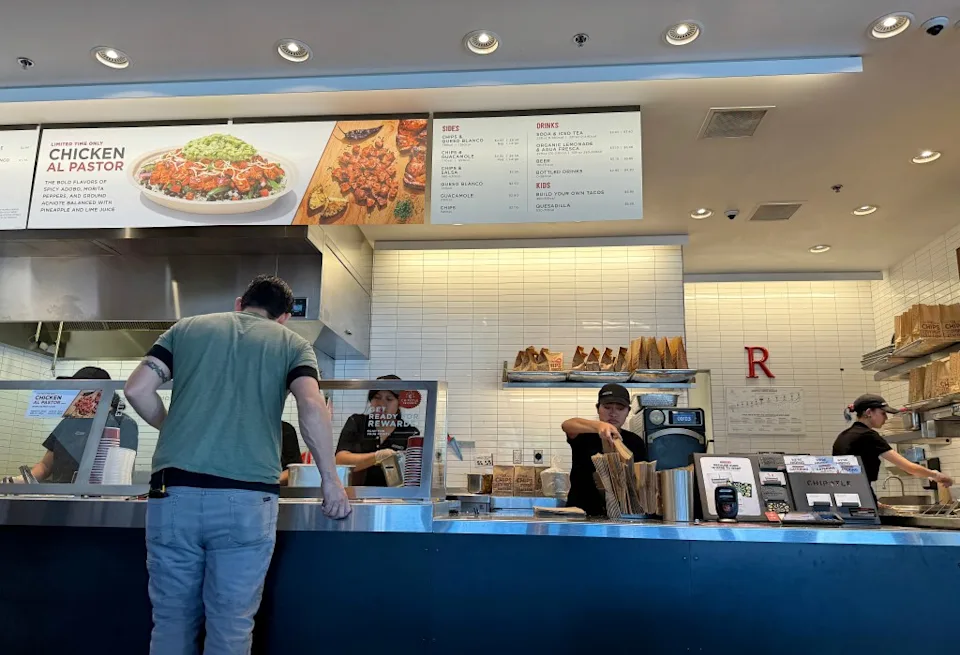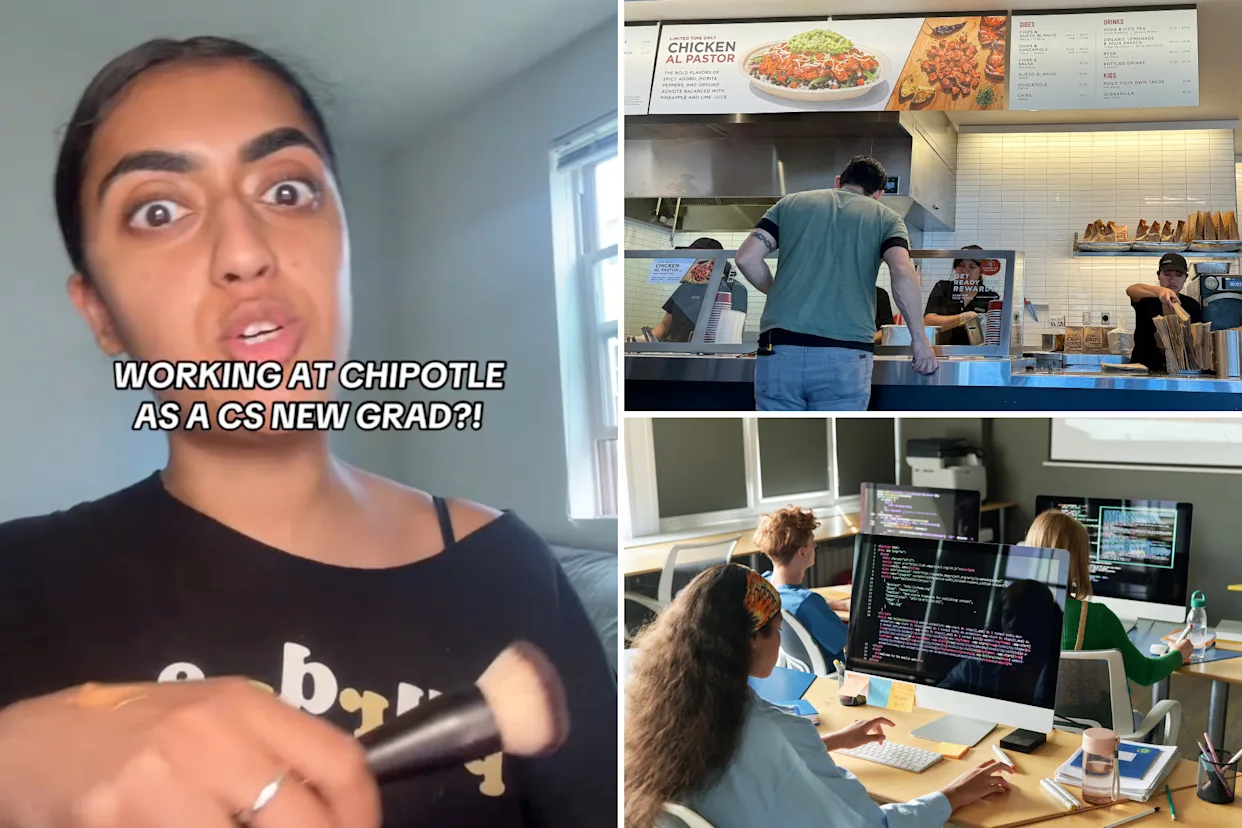By Khadija Pervez | 13th August 2025 | Fypfeed
AI Has Taken Their Jobs As Manasi Mishra enrolled in computer science at Purdue University, she imagined the possibility of developing high-tech software for top tech companies. She had no idea that following graduation, her abilities would make her struggle to find a job that was relevant and instead, she would be preparing burritos in Chipotle. Chipotle.
Mishra’s tale isn’t an isolated instance. Students all over all over the United States are reporting that their dreams of becoming a tech professional are being stifled by the rapidly growing popularity of AI, which is beginning to take over coding tasks traditionally entrusted for junior programmers. “I just graduated with a computer science degree, and the only company that has called me for an interview is Chipotle,” Mishra posted in a video last summer. The video has since been embraced by thousands of struggling students.




Her story highlights the drastic shift in the technology job market, in which the potential of programming as a way to earn earning six figures is more uncertain. According to figures from the Federal Reserve Bank of New York, the unemployment rate for recent graduates of computer science currently is 6.1 percent, while engineers in the field of computer engineering have the prospect of a 7.5 percent unemployment rate. This is higher than the 5.3 percent average of all recent graduates, and surpass the rate of 3% for other fields like art history or biology.
Experts such as Jeff Forbes, a former National Science Foundation program director for computer education as well as workforce and development have voiced their concern about the shift. “Computer science students who graduated three or four years ago would have been fighting off offers from top firms — and now that same student would be struggling to get a job from anyone,” Forbes said to The New York Times.
For a long time, youngsters were urged to “learn to code” under the notion that learning to code could lead to lucrative jobs immediately following college. While a tiny percentage of experts in the growing AI sector have landed lucrative jobs, the majority of AI companies employ only a handful of employees, which leaves the majority of students in the shadows.
Mishra’s move to work at Chipotle illustrates the grim realities that many people are facing. In the same way, Zach Taylor, a 2023 graduate of Oregon State University, submitted more than 5,800 applications for jobs, but only got 13 interviews – but not one offer. Even those for whom applicants had previously worked before were unable to offer full-time employment which left many fresh graduates dependent on temporary work or unemployment insurance.
The shift in the technology employment market is largely due to artificial intelligence. Tools such as such as GitHub Copilot and CodeRabbit are able to perform tasks that previously required human programmers with basic skills. These platforms can speed up software development by automatizing the generation of the code and suggesting possible solutions and aiding in debugging, allowing for companies to complete their projects with less junior employees.
Dario Amodei, the CEO at the AI company Anthropic Amodei, who is the CEO of Anthropic, has stated that AI could take over 50% of white collar entry-level positions in the next five to one years. The speed and efficacy that AI tools AI tools, in conjunction with the competitive market for jobs, make it more difficult for graduates to land the jobs they were prepared for.
Tech executives and economists have also identified other factors that contribute to. The overstaffing of post-pandemic recovery as well as strict cost-cutting measures high interest rates and constant recruitment freezes in major corporations have increased the pressure for tech workers at entry levels. There is debate on what percentage of this slowdown may be directly due to AI as opposed to broader economic trends but there is general agreement that the working environment for tech new hires is extremely competitive and demanding.
Candidates must go through a difficult hiring process, which often involves numerous online programming problems, live technical tests and multiple interviews but only to be rejected or not considered. Many graduates describe the experience in terms of “bleak” or “soul-crushing,” and others are “gaslit” by an industry which once promised a near-certain job.
In major cities like San Francisco, large billboards are now advertising AI-powered programming software that claims to be superior to human programmers in speed and precision. While tools like GitHub Copilot and CodeRabbit are not used in a widespread manner however, they are becoming more common within tech companies, allowing companies to decrease their dependence of junior engineers. This has created a sense of discontent among students who are looking to enter the industry through traditional routes.
Audrey Roller, a recent data science graduate of Clark University in Massachusetts, explained her strategy for finding work. “I write every application from scratch without using AI — hoping my personal touch might help me stand out,” she stated. But she was sent an email with a rejection message within three minutes of having submitted an application. This, she believes was due to automatic screening algorithm.
Coding bootcamps that for more than 10 years offered an alternative route to tech jobs for those with no degree in computer science have seen a drop in graduate job opportunities. According to Reuters the programs are having trouble putting graduates into jobs in the tech industry, with a lot of cohorts reporting only 37% to 50 percent of the students find jobs in the first six months after finishing the course.
Jonathan Kim, who paid around $20,000 for a half-time training course offered by Codesmith at the end of 2023 was able to apply to over 600 positions but without any success. At present, he is employed in his uncle’s ice-cream shop, while contributing to open-source projects as a side. “They sold a fake dream of a great job market,” the man told Reuters.
At Codesmith the school, just 37% students enrolled in its 2023 part-time program were able to find full-time employment within six months, which is a stark drop from 83 percent in 2021. However however, the school pointed out that 70 percent of the full-time program’s graduates are eventually employed within one year, which shows the challenges and possibility of the eventuality of success.
Experts in the tech field have observed that the current economic climate is driving companies back to recruiting at top schools like MIT and Stanford as well as changed some of the gains in diversity that coding bootcamps have previously facilitated. Michael Novati, co-founder of Formation Dev, noted that “They’re sending their recruiters to MIT and Stanford and wining and dining the top students,” an approach that puts other candidates at the disadvantage.
The cumulative impact of these changes is significant. Graduating students who anticipated a clear pathway from school to work have now faced unprecedented difficulties. AI along with changing economic conditions and hiring practices, has altered the employment marketplace in a way that no one were expecting. While some bootcamp participants are still able to find some success, others find themselves forced to jobs outside of their area or continue to develop their skills on their own in the hope of remaining relevant in an ever-changing sector.
For many those who have gone through this, it was both humbling and frustrating. Students report feeling exhausted from repeatedly being rejected and the difficulties in navigating a market controlled by automated system. They report feeling like their degrees earned through hard work don’t guarantee the jobs they had been promised.
Manasi Mishra’s path to Chipotle is a perfect example of a generation that has to face these unexpected obstacles. While the advent of AI has provided opportunities to certain people, it has also eliminated entry points for others and forced them to reconsider their expectations for their careers and strategies. The combination of automated processes and selective hiring practices and the current economic climate implies that tech professionals need to be perseverant and flexible in order to make a mark within the market.
In the end, the changing employment market has become a stark picture for students who are just graduating. AI is changing the nature of entry-level jobs and coding bootcamps aren’t anymore a guarantee to a job, and conventional expectations about careers after graduation are under threat. Graduates have to contend not just with their peers, but also with the advancement of technology that allows them to perform their tasks quicker and more effectively. While some might find some success, most will have to manage temporary or unrelated work, which highlights the need for urgent policies in career guidance, as well as assistance systems to help graduates adjust to the new world.
















